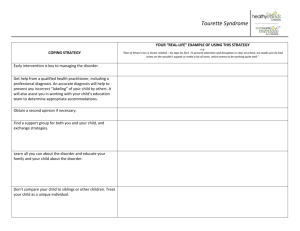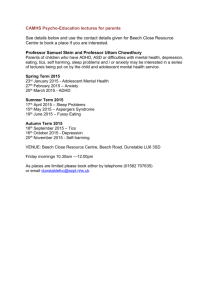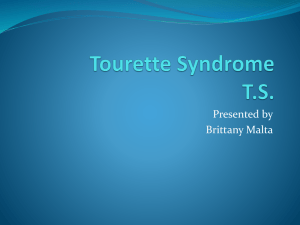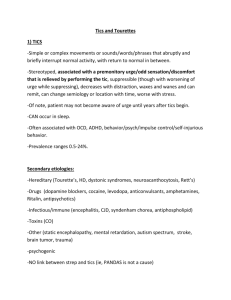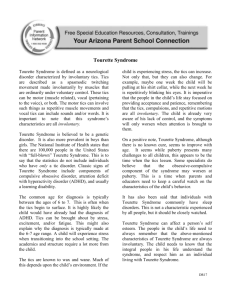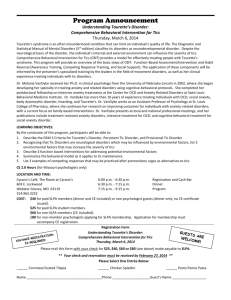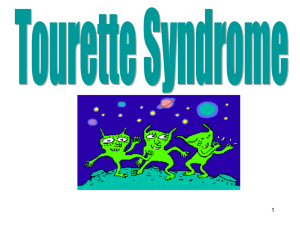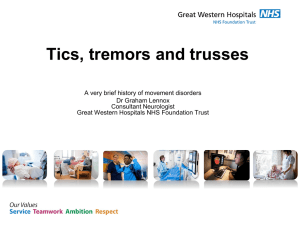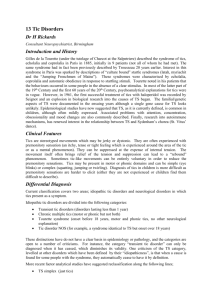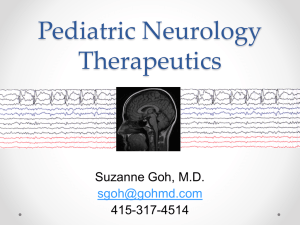blog_december_1_2013 - Tourette Syndrome Association
advertisement
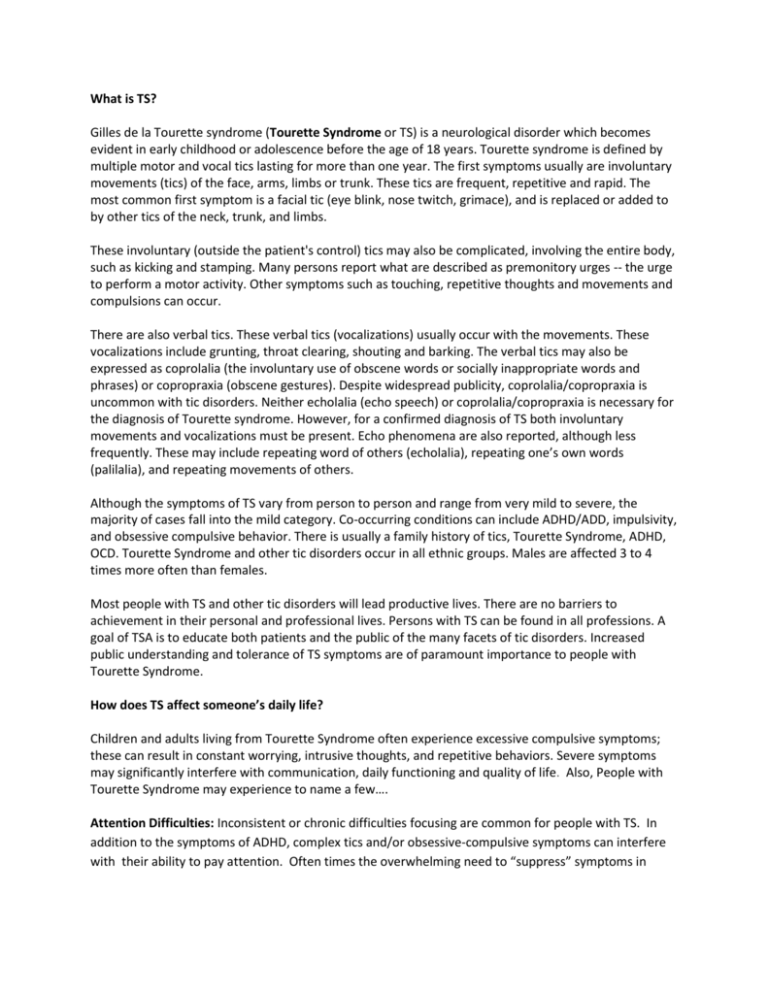
What is TS? Gilles de la Tourette syndrome (Tourette Syndrome or TS) is a neurological disorder which becomes evident in early childhood or adolescence before the age of 18 years. Tourette syndrome is defined by multiple motor and vocal tics lasting for more than one year. The first symptoms usually are involuntary movements (tics) of the face, arms, limbs or trunk. These tics are frequent, repetitive and rapid. The most common first symptom is a facial tic (eye blink, nose twitch, grimace), and is replaced or added to by other tics of the neck, trunk, and limbs. These involuntary (outside the patient's control) tics may also be complicated, involving the entire body, such as kicking and stamping. Many persons report what are described as premonitory urges -- the urge to perform a motor activity. Other symptoms such as touching, repetitive thoughts and movements and compulsions can occur. There are also verbal tics. These verbal tics (vocalizations) usually occur with the movements. These vocalizations include grunting, throat clearing, shouting and barking. The verbal tics may also be expressed as coprolalia (the involuntary use of obscene words or socially inappropriate words and phrases) or copropraxia (obscene gestures). Despite widespread publicity, coprolalia/copropraxia is uncommon with tic disorders. Neither echolalia (echo speech) or coprolalia/copropraxia is necessary for the diagnosis of Tourette syndrome. However, for a confirmed diagnosis of TS both involuntary movements and vocalizations must be present. Echo phenomena are also reported, although less frequently. These may include repeating word of others (echolalia), repeating one’s own words (palilalia), and repeating movements of others. Although the symptoms of TS vary from person to person and range from very mild to severe, the majority of cases fall into the mild category. Co-occurring conditions can include ADHD/ADD, impulsivity, and obsessive compulsive behavior. There is usually a family history of tics, Tourette Syndrome, ADHD, OCD. Tourette Syndrome and other tic disorders occur in all ethnic groups. Males are affected 3 to 4 times more often than females. Most people with TS and other tic disorders will lead productive lives. There are no barriers to achievement in their personal and professional lives. Persons with TS can be found in all professions. A goal of TSA is to educate both patients and the public of the many facets of tic disorders. Increased public understanding and tolerance of TS symptoms are of paramount importance to people with Tourette Syndrome. How does TS affect someone’s daily life? Children and adults living from Tourette Syndrome often experience excessive compulsive symptoms; these can result in constant worrying, intrusive thoughts, and repetitive behaviors. Severe symptoms may significantly interfere with communication, daily functioning and quality of life. Also, People with Tourette Syndrome may experience to name a few…. Attention Difficulties: Inconsistent or chronic difficulties focusing are common for people with TS. In addition to the symptoms of ADHD, complex tics and/or obsessive-compulsive symptoms can interfere with their ability to pay attention. Often times the overwhelming need to “suppress” symptoms in public can impact their ability to attend outings, or attend to the learning environment as well as in testing situations. Executive Dysfunction: Many people with Tourette Syndrome are chronically disorganized. A person may possess extraordinary talents and abilities, but do not consistently possess the organizational capacities necessary to demonstrate these abilities in a manner that is productive. Handwriting: Difficulties with writing may include sloppiness, frequent erasing, time consuming effort at perfectionism, difficulty organizing thoughts, reduced output, handwriting difficulties, and writing that is difficult to read. Many people with TS are significantly impacted by difficulties with written language. Dysinhibition: Dysinhibition is characterized by a difficulty inhibiting thoughts and /or actions consistently. They may be impulsive and experience inconsistent ability to use “mental brakes” appropriately. Auditory and Visual Processing: Frequently, people with TS have difficulty processing information and often need more time to answer a question or respond to a directive. Anxiety: Anxiety is a common problem for youngsters and adults with TS, particularly if they also have OCD symptoms. Students appear to be chronically inflexible. What appears to be ‘bad choices’ and behaviors may be a desperate attempt on the part of the child to bring a sense of control to a world of inconsistent difficulties. Sometimes youngsters will refuse supports/accommodations because they feel it singles them out as being different which is often what they are trying desperately to avoid. Immature Behaviors: Frequently children with TS will act in an immature fashion and display behaviors that are typical of a much younger student even though they possess more advanced academic abilities. Often students experience difficulties with transitions – one task to another or from one environment to another Social Skills: Many people with TS have above average to superior academic abilities, but have social skill deficits. Rigidity in their thinking, tendency to interpret things in a very literal fashion, not understanding ‘social cues’ often result in inappropriate social interactions. How can doctors diagnose TS? There's no specific test that can diagnose Tourette syndrome. Instead, doctors must rely on the history of symptoms to diagnose the disorder. The Diagnostic and Statistical Manual of Mental Disorders (DSM) determines the criteria for a diagnosis of Tourette syndrome. Published by the American Psychiatric Association, the DSM is used by mental health professionals to diagnose certain conditions and by insurance companies to reimburse for treatment. The criteria to diagnose Tourette syndrome include these: Both motor tics and vocal tics must be present, although not necessarily at the same time. Tics occur several times a day, nearly every day or intermittently, for more than a year. There must not be a break in tics for more than a three-month period. The onset of tics occurs before age 18. Tics aren't caused by medications, other substances or another medical condition. Diagnosis of Tourette syndrome may be delayed because families and even doctors are sometimes unfamiliar with the symptoms, or the symptoms may mimic other problems. Eye blinking may be initially associated with vision problems, for instance, while sniffling may be attributed to allergies. Because other serious health conditions can cause motor or vocal tics, your doctor may suggest having tests to rule out other causes. These tests include blood tests or neuroimaging studies, such as magnetic resonance imaging (MRI). How many people in the U.S are diagnosed with TS? It is not known exactly how many people have Tourette Syndrome (TS). A Centers for Disease Control and Prevention (CDC) study has found that 3 of every 1,000 children 6 through 17 years of age and living in the United States have been diagnosed with TS based on parent report; this represents about 148,000 children. Other studies using different methods have estimated the rate of TS at 6 per 1,000 children. What is an early indicator of TS? Simple motor tics of the face and head/neck region are the most common first tics in children. Motor Tics, Eye blinking, Eye rolling (eyes may "dart" in various directions) , Facial grimacing (nose wiggles, mouth movements), Hands (may "comb" hair repeatedly; bring hands to nose to "sniff") Vocal Tics ,Throat clearing (very common) ,Intermittent "cough", in absence of any illness "Sniffing" without signs of a cold ,Guttural sounds Humming, Rarely, saying actual words or swearing. At what age do people show their first tic? While the average age of onset of TS is 6 – 7 years old, there are many cases where parents later realized that their child’s tics had actually started much younger. In almost all cases, TS emerges before age 18, but there are exceptions. In some children, TS may emerge more forcefully or explosively. A child with no recognized history of tics may suddenly erupt in a number of tics within a very short period, or the child may present with complex tics instead of simple tics. Another situation in which severe tics or symptoms may emerge is those cases that appear to be related to infections. Approximately 3% of children in regular education classrooms may have Tourette Syndrome; more than 7% of children in special education have Tourette Syndrome. The majority of these children have never been diagnosed. I knew our son had TS at age two but, the doctors wouldn’t give a formal diagnosis until he was 9. He started out with simple motor tics of the face. Do you know anyone with TS and how do they deal with their tics? (Please don’t use an actual name.) Yes, my child has TS. He deals with his tics in many different ways. At school he tries to suppress them so that other kids do not see them, but at home he feels more free and does not suppress them. In his case he has had several physical tics including, facial tics and grimaces, hand flicks and shoulder shrugs, and a painful tic where he crunches his abdomen all this time. His vocal tics also vary widely and include squeaks and throat clearing sounds. One factor that is worth mentioning is that when a child suppresses tics all day during school, they will often experience behavior storms at home when they allow a day’s worth of feelings , tics and emotions all come out in the safety of their home. Is there any medicine that can help? Most cases of TS are thought to be “mild,” meaning that the individual does not seek treatment and/or does not experience significant interference in their life from their tics. If tics become problematic, there are a variety of medications that may provide some relief from the tics and at least one empirically validated non-medication treatment for tics. You have to also remember that along with Tourette Syndrome some people experience co-morbid conditions such as Anxiety, Depression, ADHD and OCD. There are medications that can help control and treat the symptoms of these co-morbid conditions, but it is up to each individual and their medical team to decide what treatments and medications are appropriate. Other factors can also influence the frequency or severity of tics. Factors that decrease tics are: Distracted, Non-anxiously engrossed, During skilled tasks, During sleep Summer vacation, Waning cycle Nicotine, Asked to suppress tics (initial response), Novel situation, Doctor’s examining room Is there a physical barrier that a person with TS can experience? Yes, for example: physical barriers for communication can be simple things like other conversations around you, time limits and even noise from traffic outside. There are many physical barriers, for all kinds of communication, whether that's text, oral, or over the telephone. Some physical barriers are motivated by fear. Lessons learned from negative childhood socialization experiences can cause excessive fear, mistrust and nervousness when attempting communication with others. An example of a learned emotional barrier is an inability to trust someone with your thoughts, feelings or ideas due to a fear of judgment from other people and the perceived ridicule that accompanies that judgment. Where is a good place for a person with TS to go for support if they need it? Check out our Website and face book page! TSA-MN conducts a variety of programs including social events, educational programs and family camp, there are also local TS Support Groups, TSA-USA has a great website, and Physicians and/or Mental Health provider, plus county human services departments can make referrals for supports. Hope this helps! Be sure to watch for another entry in the blog. Next month’s topic: Tourette Syndrome and Social Security Disability Benefits. Blog edited by Lori & Brian Swerine, TSA-MN Board Members and TS parents
